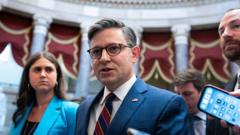Will Trump's Desk Approve the Bill Cutting Foreign Aid and Public Broadcasting?

## Understanding the Recent Funding Cuts: Implications for Public Broadcasting and Foreign Aid
In a significant political maneuver, the U.S. House of Representatives has voted to approve a bill that will retrieve billions of dollars in previously allocated funding for public broadcasting and foreign aid. This decision, which comes amid ongoing debates about government spending, reflects a broader Republican strategy aimed at reducing federal expenditures. With a final vote tally of 216 to 213, the bill is now headed to President Donald Trump's desk for approval, marking a pivotal moment in the current legislative landscape.
### Summary of the Bill
The approved legislation will result in a total cut of approximately $9 billion, impacting various sectors, particularly public broadcasting and international aid programs. Republican leaders view this as a crucial first step in a more extensive effort to tighten the federal budget. The bill's passage was marked by significant party division, with all Democrats and only two Republicans opposing the cuts, highlighting the contentious nature of government funding debates.
### Key Features of the Bill
1. **Total Funding Cuts**: The legislation aims to rescind $9 billion in total funding, a sharp reduction that signals the Republican commitment to reining in government spending.
2. **Affected Programs**:
- **Corporation for Public Broadcasting (CPB)**: This includes significant cuts to PBS and NPR, which have historically provided essential programming and services to millions of Americans.
- **U.S. Agency for International Development (USAID)**: Recognized as the largest U.S. global humanitarian program, cuts to USAID may impact various international development and humanitarian initiatives.
3. **Political Context**: The bill follows a Senate approval that took place less than 24 hours earlier, underscoring the rapid pace at which the Republican agenda is being pushed through Congress.
4. **Presidential Support**: President Trump expressed strong support for the bill, highlighting its importance in the broader context of his administration's spending policies.
### The Implications of Funding Cuts
The implications of these funding cuts are far-reaching, affecting both domestic and international landscapes. Here are some critical areas of concern:
#### Impact on Public Broadcasting
Public broadcasting has been a cornerstone of American media, providing educational content, news, and emergency broadcasting services, especially crucial in rural communities. The proposed cuts raise several concerns:
- **Loss of Local Programming**: The funding cuts could lead to reduced local news coverage, limiting access to vital information for communities that rely on these services.
- **Emergency Services**: As highlighted by NPR President Katherine Maher, public radio serves as a critical link for emergency alerts and weather updates, particularly in areas prone to natural disasters. The reduction in funding could undermine these essential services.
#### Effects on Foreign Aid
The cuts to USAID and other foreign aid programs could have several global repercussions:
- **Humanitarian Impact**: The largest U.S. global humanitarian program plays a significant role in addressing poverty, health crises, and disaster relief. Reductions in funding may hinder these efforts, affecting millions of individuals worldwide.
- **Diplomatic Relations**: U.S. foreign aid is often tied to diplomatic efforts and international relations. Reducing funds could strain relationships with partner nations that benefit from U.S. support.
#### Broader Budgetary Concerns
The passage of this rescissions package reflects a larger Republican strategy to curtail government spending. Political leaders have indicated that this may be the first of many such measures, suggesting a trend towards more stringent budgetary controls.
- **Long-term Budgetary Strategy**: House Speaker Mike Johnson emphasized that this is not the end but rather the beginning of a broader approach to manage federal spending.
- **Public Response**: The public reaction to these cuts has been mixed, with significant concern from advocacy groups and constituents who value public broadcasting and international aid.
### The Political Landscape
The political environment surrounding these budgetary decisions is complex. The close vote in the House illustrates the deep divisions within Congress regarding spending priorities.
#### Republican Strategy
Republicans have framed these cuts as necessary for fiscal responsibility. They argue that reducing funding for programs like public broadcasting and foreign aid is essential for reallocating resources to areas they deem more critical.
- **Fiscal Responsibility**: Many Republican lawmakers and constituents support the idea of a leaner federal budget, believing it will lead to more efficient government spending.
- **Political Messaging**: The successful passage of this bill reinforces the Republican narrative of reducing government intervention and expenditure.
#### Democratic Opposition
On the other side of the aisle, Democrats have raised alarms about the potential consequences of these cuts. Their opposition is rooted in concerns about the societal impact of reduced funding for essential services.
- **Advocacy for Public Services**: Democrats argue that public broadcasting and foreign aid are crucial for maintaining a well-informed citizenry and fostering global goodwill.
- **Counterarguments**: Many Democrats underscore the importance of these services in promoting diversity of thought and addressing humanitarian needs.
### Historical Context
This rescissions package represents a significant moment in legislative history, as it is the first successful effort to claw back approved funding in over 30 years. This historical precedent raises questions about future budgetary practices and the potential for similar initiatives in the coming years.
### Future Outlook
As the bill moves toward the President's desk for signing, the future of public broadcasting and foreign aid remains uncertain. The potential for further cuts looms large, indicating that this issue will remain at the forefront of political discourse.
#### Potential for Further Cuts
Given the Republican leadership's commitment to reducing government spending, it is plausible that additional rescissions packages could be introduced in the future. This could lead to:
- **Increased Pressure on Public Services**: Further cuts may exacerbate the challenges faced by public broadcasting and international aid programs, necessitating urgent advocacy efforts from supporters.
- **Shift in Legislative Focus**: As lawmakers focus on budgetary measures, other critical issues may be overshadowed, impacting legislative priorities.
### Conclusion
The recent passage of this funding cuts bill marks a significant shift in U.S. government spending priorities. As public broadcasting and foreign aid face substantial reductions, the implications of these decisions will resonate across various sectors.
As the political landscape evolves, the balance between fiscal responsibility and the need for robust public services will continue to be a contentious issue. The future of public broadcasting and international aid hangs in the balance, as advocates for these programs prepare to respond to the changing tides of government funding.
What are your thoughts on the potential impact of these funding cuts? Will they alter the landscape of public broadcasting and foreign aid in the U.S.?
### FAQs
#### What does the bill entail concerning public broadcasting funding?
The bill proposes significant cuts to the Corporation for Public Broadcasting, which includes major networks like PBS and NPR, potentially affecting local programming and emergency broadcasting services.
#### How will foreign aid be impacted by the funding cuts?
The cuts will affect the U.S. Agency for International Development (USAID), which plays a crucial role in global humanitarian efforts, possibly hindering various international development programs.
#### Why was this bill passed with such a narrow margin?
The bill's passage reflects deep partisan divisions within Congress, with all Democrats and only two Republicans voting against the cuts, showcasing differing priorities on government spending.
#### What are the long-term implications of these funding cuts?
These cuts may lead to reduced services in public broadcasting and foreign aid, impacting local communities and global humanitarian efforts. Additionally, they signal a potential trend towards more stringent budgetary measures in the future.
#### What does the future hold for public broadcasting and foreign aid in the U.S.?
The future remains uncertain, as ongoing political discussions may lead to further cuts or changes in funding strategies, impacting the viability of these essential services.
### Final Thoughts
The ongoing debate over government spending and funding priorities is critical for shaping the future of public services in the United States. How do you see these changes affecting our society and global humanitarian efforts?
#PublicBroadcasting #ForeignAid #GovernmentSpending
Published: 2025-07-18 12:14:02 | Category: wales



